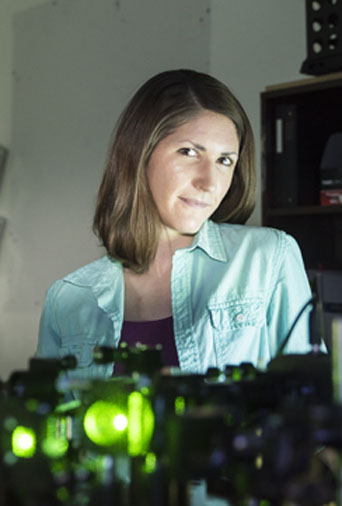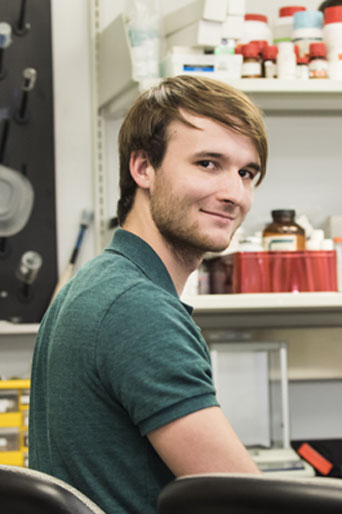
Iris Stone. Photo by Ron Aira.
When Iris Stone and Zachary Baker filled out their Goldwater Scholarship applications, they kept their expectations in check.
Stone, a senior physics major, said the process is so competitive “you don’t want to be disappointed.”
Baker, a sophomore bioengineering major, said his plan was to get feedback from the Barry Goldwater Scholarship and Excellence in Education Foundation to take another run at the scholarship as a junior.
In both cases, results exceeded expectations as the George Mason University students received the prestigious scholarship that is based on academic merit and targeted to undergraduate students in the natural sciences, mathematics, and engineering.
“I was amazed,” Baker said.
Said Stone: “I got an email saying congratulations, and I thought, ‘That can’t be right.’ I had to read it twice.”

Zachary Baker. Photo by Ron Aira.
Awarded since 1989, the one- or two-year Goldwater Scholarship provides up to $7,500 per year for tuition, fees, books, and room and board. There were 240 recipients this year out of 1,286 applications from colleges and universities nationwide.
Stone and Baker, both members of the Honors College, are the third and fourth winners from George Mason. Lucas Bouck, a junior mathematics major, received honorable mention.
“For Mason to have two students win in one year signifies that its commitment to undergraduate research is helping our students gain national recognition for their accomplishments,” said LaNitra Berger, director of the Office of Fellowships in the Honors College.
Institutions nominate the applicants, who must produce an essay that describes original research. Helping in that effort were Kathleen Alligood, associate dean of the Honors College, and Patricia Granfield, the Honors College STEM coordinator.
Stone looked into charge-transfer crystals, in which electronic charges are transferred between molecules to stabilize the combination. The quest is to combine organic (that is, carbon-based) molecules to create materials for lighter, cheaper, bendable and even biocompatible electronic devices.
Baker investigated how sodium chlorate impacted the electrophysiological activity of spinal cord neurons of embryotic mice in an effort to understand why central nervous systems in mammals cannot regenerate after injury.
“He completed, by himself, experiments that my undergraduates can rarely complete without guidance,” said Nathalia Peixoto, associate professor of electrical and computer engineering.
As for Stone, “she is one of the best students I’ve ever worked with,” said Patrick Vora, assistant professor of physics.
Stone will be doing neurophysics research at UCLA this summer through the Research Experience for Undergraduates program administered by the National Science Foundation. Baker will intern at Johns Hopkins University’s Institute of Cell Engineering.
“Whether I had an award or not, I’d be pushing forward in this path,” Stone said. “But the external acknowledgment you are on the right path, that’s certainly a nice feeling.”
